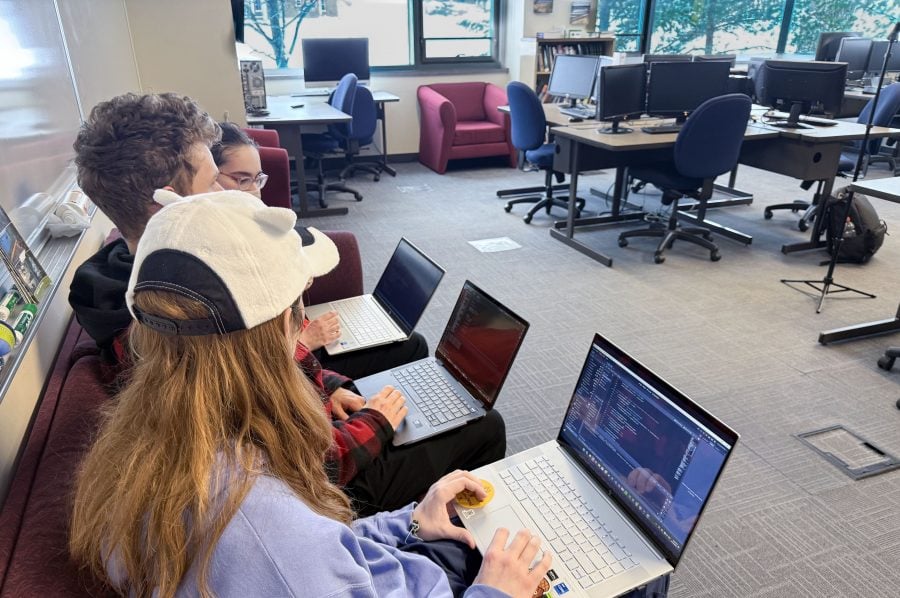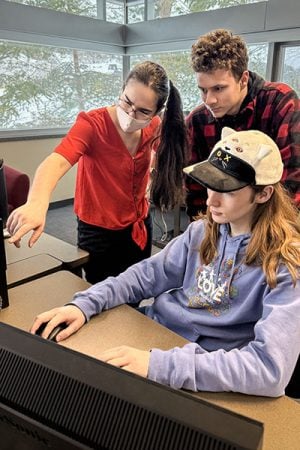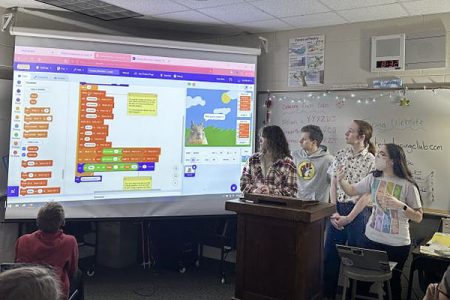
It’s a building year for Copper Country Coders, and the students taking on stewardship of the group, which was established in 2011, are definitely up to the task.
They remember what it was like to be captivated by coding at a young age. They enjoy hanging out with fellow Huskies. And they love to teach.
K. Fresonke, ‘28, who is majoring in software engineering and math education with a minor in physics, learned to code in fourth grade. “And that’s why I’m doing it now,” they said.
For computer science major Dominic Hann, ’28, education runs in the family.
“My mom was a teacher,” said Hann. “She was always helping out teaching younger students how to code.”
Yasmin Fitzgerald ’26, a software engineering major with a minor in Enterprise, is also a College of Computing Learning Center Coach, and a Computer Science Lab assistant. “Teaching is the best way to learn yourself,” she said.
While the Coders share a common goal, each is pursuing a very distinct education path at Michigan Tech. Fresonke is drawn to “the mix between art, math, and teaching.” For Hann and Fitzgerald, it’s the logic they love. “I like software, not games as much,” said Fitzgerald.

The group presented their first event during fall semester, working with Charles Palosaari’s science and technology class at nearby Jeffers High School. Overall, it was a success, although the Coders said students seemed to be a little distracted due to a string of snow days—a regular winter occurrence in Michigan’s Keweenaw Peninsula.
The slightly chaotic vibe was OK with them. They don’t think beginners should take their coding too seriously. “We were able to bring the fun, just getting them to make things,” said Fresonke. “We wanted to show them that coding is play.”
Noting that the class they visited is usually focused on making websites, Hann said the Coders provided some welcome variety. He agrees that it’s more important to get students excited about coding than to require them to perform a particular task. “We didn’t have a strict curriculum,” he said.
Signs of success: the teacher thought the students were very engaged and asking good questions. And the Coders got creative, handmade thank-you cards. “It was really cute,” said Fitzgerald.
Join Copper Country Coders
Membership is open to all Tech students who want to hone their skills in teaching, leadership, communication, and teamwork while helping kids get excited about computer science.
You can connect with the Coders on their Discord, or email coders@mtu.edu
Or just show up for the regular meetings, from 3-4 p.m. Fridays during the academic year in Rekhi 118.
Leo Ureel, an assistant professor in both the Computer Science and Psychology and Human Factors departments at Tech, is the Coders co-advisor. He’s been with the program a long time, coming in a couple of years after it was founded by Computer Science Professor Charles Wallace.
Ureel said he wasn’t surprised by the enthusiastic reception. He’s seen the talent that Coders have for engaging younger students, which they demonstrated again at an event in Houghton this year. “Their teaching makes a big impression,” he said.
Copper Country Coder membership has varied through the years, but the group experienced a severe drop due to the global pandemic beginning in 2020, when it became impossible to hold on-site student experiences.
Ureel said he wanted to revitalize the program because of the benefits it brings to students of all ages who are involved in the program. His family experienced it firsthand.
“I remember when Dr. Wallace started Copper Country Coders because my daughter was in middle school at the time. Coders filled a need for computing for kids in the community. The mix of middle school kids learning from undergrads makes Coders fun for everyone,” he said.
The need to enhance learning opportunities hasn’t changed, said Ureel. Computer science curriculum remains sparse in Michigan’s K-12 schools. Options outside of the classroom are also limited. Copper Country Coders presents a solution, working with students in grades six to 12. Typically, two to four undergraduate tutors teach in classrooms of 15 to 30 students.
Moving forward, the group is refining established lesson plans and creating new ones. They want to increase visits to local schools. Copper Country Coders also want to return to hosting weekly classes, which were a hit with both students and parents. And they’re hoping to expand the current age range to make learning programs available to younger students. The larger goal is to encourage kids to explore the field of computing and follow their interests for a lifetime—whether for fun or professionally.
While Ureel feels strongly about supporting the program, he doesn’t view his role as key to the group’s success. These motivated and talented students have things well in hand, he said.
“They make my job as advisor easy. They are intrinsically motivated to develop all of the activities, test all of the code used, contact the teachers, and plan the events. I don’t know where they find the time, but they make it happen because this is important stuff,” he said.
Other current Copper Country Coders members include computer science majors Noah Halkola, ’28, and Bethany Brown, ’26. Brown said she wanted to be part of the group because—we’re sensing a theme here!—she’s interested in education. “This is a great opportunity to teach others about code,” she said.

While the Coders want to build up group membership, there’s no need to go looking for folks who want to work with them. Requests continue to come in regularly. The group worked with high schoolers in the Keweenaw Community Alliance for Progressive Education (CAPE) this week. “We were there for a Python crash course,” said Ureel.
More members means more outreach will be possible. Fresonke encourages all interested Huskies to get in touch now, even though the academic year will soon come to a close. Huskies can also look for events early next fall semester that will help them see if the group is a good fit for them.
“We’re doing a lot of planning to get positioned for doing more events next year,” Fresonke said. “A few of us have been working to get it going and we’re looking forward to adding more members. Stop by and see us if you like thinking on your feet—communicating with kids is hard!—and want some communication and teaching experience that looks good on your resume.”
About the College of Computing
The Michigan Tech College of Computing, established in 2019, is the first academic unit in Michigan dedicated solely to computing, and one of only a handful such academic units in the United States. The college is composed of two academic departments. The Computer Science department offers four bachelor of science programs in computer science, cybersecurity, data science, and software engineering; four master of science programs in applied computer science, computer science, cybersecurity, and data science; and a doctoral program in computer science. The Applied Computing department offers four bachelor of science programs in cybersecurity, electrical engineering technology, information technology, and mechatronics; and two master of science programs in health informatics and mechatronics. The college also helps to administer an interdisciplinary doctoral program in computational science and engineering.
Questions? Contact us at computing@mtu.edu. Follow the College of Computing on Facebook, Instagram, LinkedIn and Twitter.